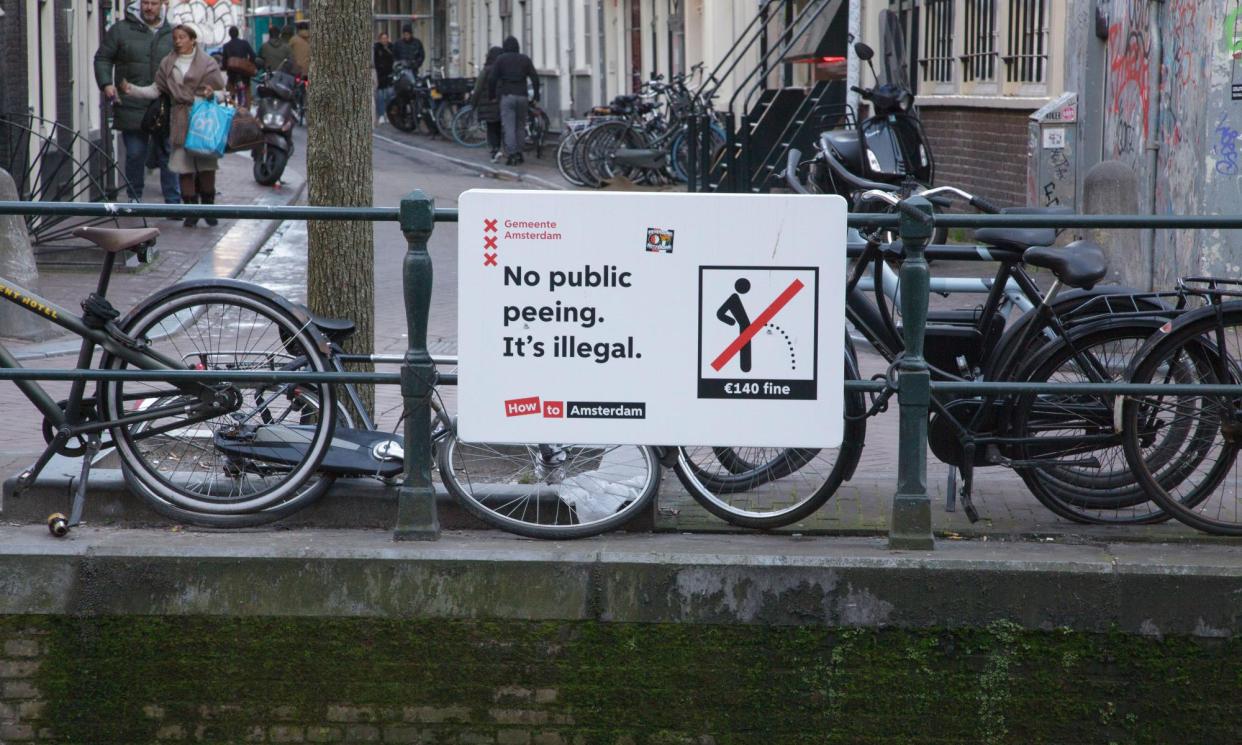‘Urination equality’: Amsterdam women win fight for more public toilets

The need kicked in as Geerte Piening was on her way home from a bar one night in 2015. She swiftly weighed her options: it was past closing time in Amsterdam’s lively Leidseplein area, meaning she could not duck into a bar to use their facilities, while the nearest public toilet was 2km away.
She resorted to squatting in an alleyway, coaxing her friends to cover her as she did so. Police soon turned up, handing her a €140 (£118) fine for public urination.
Few could have predicted what would come next. After a nine-year battle for “urination equality” in which thousands took to the streets of the Netherlands, this month Amsterdam said it would open more public toilets in October.
The day after Piening was fined, she woke up furious about the injustice of it. “There were a lot of urinals for men nearby but I couldn’t go anywhere to pee,” she said. “I thought, OK, this is an issue.”
Piening, then 21 years old, penned a letter challenging her fine, pointing out that Amsterdam was home to 35 public urinals for men and only three public toilets for women. “It doesn’t only affect women, but also people in wheelchairs,” she said. “It’s really important that there are places for everyone.”
After two years went by without any formal response, Piening found herself suddenly summoned to court to address the outstanding fine. “I thought: ‘What? I have to go to court? OK, weird, but yeah, let’s go.’”
She began spreading the word, sharing her incredulity over being hauled into court over the issue of potty parity. About 20 media representatives showed up to document her court appearance, as the judge rejected her appeal but cut her fine to €90 due to the length of time the case had taken to reach the courts.
The judge also offered his own view on the issue, telling Piening that despite the lack of female facilities she should have made use of a men’s urinal. “It may not be pleasant but it is possible,” he said.
Over coffee later with her loved ones, Piening pondered the judge’s suggestion. “We were all laughing about it because it was so ridiculous,” she said. “I think that is definitely not possible.”
Across the country, the response was much sharper. Protests began to pop up in cities across the country, calling on women to challenge the judge’s view.
“Women from across the country are invited to demonstrate the (im)possibilities of urinating in a public urinal built for men,” said the organisers of one protest coined “Power to the Peepee”.
Others posted photos online showing themselves twisted in knots and attempting ambitious gymnastic poses in order to comply with the judge’s orders, with some signed on to a petition calling on the country’s minister of education, culture and science to tackle “urination equality”.
Among those who joined the movement to combat sanitary sexism was Ilana Rooderkerk, who at the time was an Amsterdam city councillor.
“There are things that once you see them, you can’t unsee them,” said Rooderkerk, who is now a member of the Dutch parliament. “And this is a perfect example of it – it’s not fair and it’s not convenient.”
She and Piening worked together to put forward municipal legislation calling on Amsterdam to expand the number of accessible public toilets. The reaction was initially mixed. “At first people were thinking, what’s the big deal, or they found it a bit weird to talk about,” she said. “But I always made the point that when it’s something so basic, why don’t we just have this figured out? Especially when it’s figured out for half of the city’s population but not the other half.”
Banding together with other female councillors, she began rallying public support for the issue. Slowly the city started to make changes, placing mobile toilets in major parks and green areas during the summer and informing the public that they could use facilities in sites such as police stations and fire halls.
But it took years to secure the ultimate victory; this month Amsterdam said new wheelchair-accessible public toilets would be available starting in October. The exact number was not confirmed though the city said its total investment would be €4m.
Among those celebrating the news was Piening. “How do I feel about it? Really good,” she said. The past nine years had been a test of patience, one that had at times been overwhelming, she said.
But it had also been a crash course in how the design of cities – often harking back to a time when women were expected to remain in the home – can actively exclude segments of the population if left unchallenged.
“I think the city is mostly built by and for men,” she said. “So if I look at it from that angle, it isn’t surprising that there are only urinals for men.”

 Yahoo News
Yahoo News 
